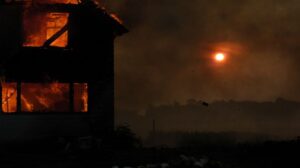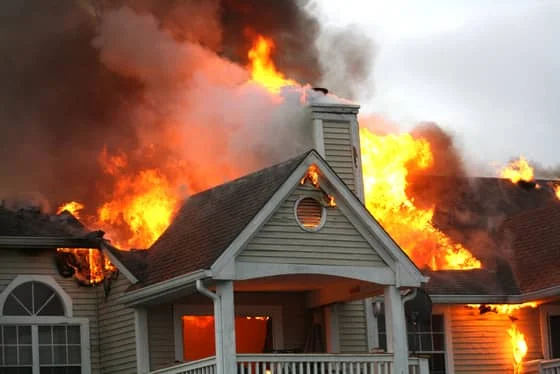As a homeowner faced with the aftermath of a house fire and the daunting decision of whether to rebuild or sell a fire-damaged house, the last scenario anyone wants to encounter is being sued by a curious neighbor who sustained injuries within your burned home. This highlights the critical necessity of taking steps to secure your fire-damaged home site. Secure the site proactively to minimize the risk of unauthorized access and potential injuries. This effectively safeguards you against any legal actions that could arise from such incidents.
That’s exactly why it’s vital to secure your fire-damaged home site. Ensure no one wanders onto the site and gets hurt by taking immediate action. Implement measures to prevent unauthorized access and safeguard the compromised structure.

Take steps to prevent scavengers from stealing property by securing the site promptly. This avoids losses you may not be reimbursed for due to delayed action.
Here are some tips to follow when securing your property:
- Don’t try to turn off any utilities yourself. The fire department must ensure all utilities (gas, water, electric) are safe or disconnected before leaving the scene.
- Notify local police that your home will be vacant to help prevent looting and break-ins. This step is particularly crucial whether you are yet to begin the restoration process or waiting to sell a fire-damaged house.
- You may also need to hire a board-up/mitigation company to pump out water, board-up openings and otherwise ensure that your property does not suffer additional damage. Depending on the level of damage, you may be able to handle this yourself – you could cover a damaged area with a tarp or board up an opening.
- It can also be a good idea to rope off the area – like you see the police do at crime scenes.
- Consider posting No Trespassing signs to prevent entry and warn that trespassers will be liable for their injuries.
What happens if someone slips and falls and gets injured on the fire-damaged house site?
When an injury is sustained from a slip and fall and there is deemed to be negligence on the part of the property owner a premise liability lawsuit is the normal legal option.
More about slip and fall injury lawsuits at fire-damaged houses
All property owners must keep their premises safe from hazards that could lead to slip and fall injuries.
They must ensure every part of the property is safe.
There are a number of things that can cause a slip and fall injury, here are some examples:
- Spilled liquids that make a floor surface slippery
- Water and soap on the floor when cleaning without adequate warning signs
- Ice and snow that hasn’t been properly removed or treated
- Broken or defective pavement or steps
- A cord, rug, or debris that can be tripped over in a walkway or path
If a defect or danger is clearly visible and easily detectable under normal circumstances, the property owner might not need to post warnings. However, determining what qualifies as a negligent act by a property owner can be complex, especially after a house fire.
Consulting an attorney after such an incident is essential to grasp your legal obligations and rights fully. It’s key for addressing the situation thoroughly, especially in securing your fire-damaged property. This step prevents further accidents and protects the property during assessment and recovery.
Determining slip and fall liability
Legal definitions determine a property owner’s responsibility for injuries in a slip and fall accident. For legal responsibility to be in effect, one of the following must be true:
- The obstruction or dangerous surface must have been caused by the property owner or one of their employees.
- The owner of the property or one of their employees must have had knowledge of the danger and neglected to take any action.
- Either the owner of the property or one of their employees could be reasonably expected to have known about the defect or danger and either repaired or removed it.
The third scenario, while most common, is also the hardest to prove in a slip and fall injury lawsuit. This is because of the subjective phrase “could be reasonably expected to have known.”
In this scenario, common sense, a subjective measure, determines the property owner’s liability. In these cases, judges and juries determine liability by assessing whether the property owner made their property safe for visitors.
How “reasonable” is defined legally
Legally, the property’s safety hinges on whether the owner regularly maintains and keeps it safe for visitors.
The following are some simple questions that will help determine if a property owner might be liable for a slip and fall injury:
- If a fall was caused by tripping over a broken area of pavement or steps, a loose area, a wet and slippery area, or a piece of carpet that is bulging, broken or torn, was the defect present sufficiently long enough that the property owner should have known about it?
- Does the property owner make regular inspections of the property to note and repair defects? If so, do they have any proof of these regular inspections and repairs?
- If you slipped or tripped over something that was intentionally placed on the ground, was there a legitimate reason for the object to be in that location?
- Does the original reason for the object being placed in a location still exist or could the object have been removed to make the area safe?
- Is there another location the object could have been placed that would have presented less risk to visitors?
- Could a warning or barrier have been placed to deter people from walking in the area?
- Was the incident partially caused by poor or broken lighting fixtures?
If the answer to even one of these questions is yes, then a person may have a good claim for a lawsuit.
Evaluating a person’s carelessness
In any slip and fall injury case, questions will arise about whether the injured person’s carelessness contributed to the incident.
Rules known as “comparative negligence” are used to determine how reasonable your actions were at the time of the accident.
Injured individuals contemplating a lawsuit due to fire damage must deliberate on several pertinent questions beforehand. An insurance adjuster is also likely to explore these questions, playing a critical role in assessing potential compensation. Amid these considerations, it’s paramount to secure your fire-damaged home site. This action not only shields the property from additional damage but also reduces the risk of facing further liabilities or claims throughout the evaluation and compensation stages.
- Was there a legitimate reason that the owner could have anticipated for a person to be in the location where the slip and fall injury occurred?
- If the person had been more careful would there have been a way to avoid the danger, or walk more carefully and avoid slipping?
- Were any warnings posted about the dangerous area?
- Was the person running, jumping, fooling around, or distracted when you fell?
Sell your fire-damaged house as-is
Want to get rid of a fire-damaged house and the headaches it can present? We Buy Fire Damaged Houses buys burned homes for cash, and buys them in as-is condition, so you can sell fast and move on with your life.
Fill out the form below to see if your home qualifies for a free quote.
Photo by Jen Theodore on Unsplash

